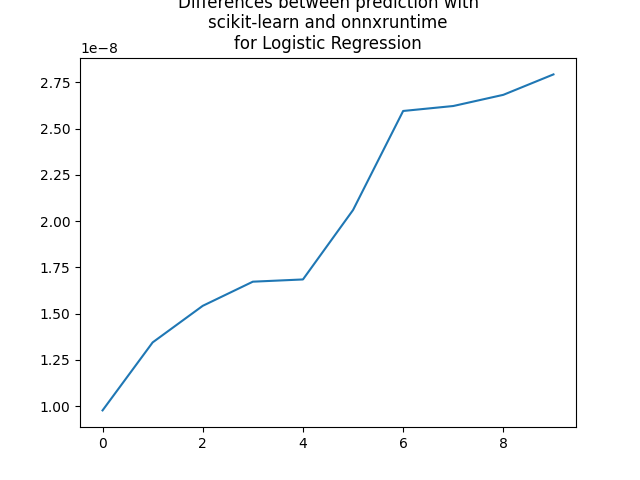Note
Click here to download the full example code
Investigate a failure from a benchmark¶
The method validate may raise an exception and
in that case, the class BenchPerfTest.
The following script shows how to investigate.
from onnxruntime import InferenceSession
from pickle import load
from time import time
import numpy
from numpy.testing import assert_almost_equal
import matplotlib.pyplot as plt
import pandas
from scipy.special import expit
import sklearn
from sklearn.utils._testing import ignore_warnings
from sklearn.linear_model import LogisticRegression
from pymlbenchmark.benchmark import BenchPerf
from pymlbenchmark.external import OnnxRuntimeBenchPerfTestBinaryClassification
Defines the benchmark and runs it¶
class OnnxRuntimeBenchPerfTestBinaryClassification3(
OnnxRuntimeBenchPerfTestBinaryClassification):
"""
Overwrites the class to add a pure python implementation
of the logistic regression.
"""
def fcts(self, dim=None, **kwargs):
def predict_py_predict(X, model=self.skl):
coef = model.coef_
intercept = model.intercept_
pred = numpy.dot(X, coef.T) + intercept
return (pred >= 0).astype(numpy.int32)
def predict_py_predict_proba(X, model=self.skl):
coef = model.coef_
intercept = model.intercept_
pred = numpy.dot(X, coef.T) + intercept
decision_2d = numpy.c_[-pred, pred]
return expit(decision_2d)
res = OnnxRuntimeBenchPerfTestBinaryClassification.fcts(
self, dim=dim, **kwargs)
res.extend([
{'method': 'predict', 'lib': 'py', 'fct': predict_py_predict},
{'method': 'predict_proba', 'lib': 'py',
'fct': predict_py_predict_proba},
])
return res
def validate(self, results, **kwargs):
"""
Raises an exception and locally dump everything we need
to investigate.
"""
# Checks that methods *predict* and *predict_proba* returns
# the same results for both scikit-learn and onnxruntime.
OnnxRuntimeBenchPerfTestBinaryClassification.validate(
self, results, **kwargs)
# Let's dump anything we need for later.
# kwargs contains the input data.
self.dump_error("Just for fun", skl=self.skl,
ort_onnx=self.ort_onnx,
results=results, **kwargs)
raise AssertionError("Just for fun")
@ignore_warnings(category=FutureWarning)
def run_bench(repeat=10, verbose=False):
pbefore = dict(dim=[1, 5], fit_intercept=[True])
pafter = dict(N=[1, 10, 100])
test = lambda dim=None, **opts: (
OnnxRuntimeBenchPerfTestBinaryClassification3(
LogisticRegression, dim=dim, **opts))
bp = BenchPerf(pbefore, pafter, test)
with sklearn.config_context(assume_finite=True):
start = time()
results = list(bp.enumerate_run_benchs(repeat=repeat, verbose=verbose))
end = time()
results_df = pandas.DataFrame(results)
print("Total time = %0.3f sec\n" % (end - start))
return results_df
Runs the benchmark.
try:
run_bench(verbose=True)
except AssertionError as e:
print(e)
0%| | 0/6 [00:00<?, ?it/s]Just for fun
0%| | 0/6 [00:00<?, ?it/s]
Investigation¶
Let’s retrieve what was dumped.
filename = "BENCH-ERROR-OnnxRuntimeBenchPerfTestBinaryClassification3-0.pkl"
try:
with open(filename, "rb") as f:
data = load(f)
good = True
except Exception as e:
print(e)
good = False
if good:
print(list(sorted(data)))
print("msg:", data["msg"])
print(list(sorted(data["data"])))
print(data["data"]['skl'])
['data', 'msg']
msg: Just for fun
['data', 'ort_onnx', 'results', 'skl']
LogisticRegression()
The input data is the following:
if good:
print(data['data']['data'])
[(array([[0.04544796]], dtype=float32),), (array([[0.7556228]], dtype=float32),), (array([[0.7013999]], dtype=float32),), (array([[0.96577233]], dtype=float32),), (array([[0.58974564]], dtype=float32),), (array([[0.7517075]], dtype=float32),), (array([[0.38275772]], dtype=float32),), (array([[0.04419697]], dtype=float32),), (array([[0.16942912]], dtype=float32),), (array([[0.5587462]], dtype=float32),)]
Let’s compare predictions.
if good:
model_skl = data["data"]['skl']
model_onnx = InferenceSession(data["data"]['ort_onnx'].SerializeToString())
input_name = model_onnx.get_inputs()[0].name
def ort_predict_proba(sess, input, input_name):
res = model_onnx.run(None, {input_name: input.astype(numpy.float32)})[1]
return pandas.DataFrame(res).values
if good:
pred_skl = [model_skl.predict_proba(input[0])
for input in data['data']['data']]
pred_onnx = [ort_predict_proba(model_onnx, input[0], input_name)
for input in data['data']['data']]
print(pred_skl)
print(pred_onnx)
[array([[0.49957775, 0.50042225]]), array([[0.50188462, 0.49811538]]), array([[0.50170849, 0.49829151]]), array([[0.50256725, 0.49743275]]), array([[0.5013458, 0.4986542]]), array([[0.5018719, 0.4981281]]), array([[0.50067344, 0.49932656]]), array([[0.49957368, 0.50042632]]), array([[0.49998048, 0.50001952]]), array([[0.50124511, 0.49875489]])]
[array([[0.49957773, 0.50042224]]), array([[0.50188464, 0.49811539]]), array([[0.50170851, 0.49829152]]), array([[0.50256723, 0.49743277]]), array([[0.50134581, 0.49865419]]), array([[0.50187188, 0.49812809]]), array([[0.50067341, 0.49932656]]), array([[0.49957368, 0.50042629]]), array([[0.49998048, 0.50001955]]), array([[0.50124508, 0.49875489]])]
They look the same. Let’s check…
if good:
for a, b in zip(pred_skl, pred_onnx):
assert_almost_equal(a, b)
Computing differences.
if good:
def diff(a, b):
return numpy.max(numpy.abs(a.ravel() - b.ravel()))
diffs = list(sorted(diff(a, b) for a, b in zip(pred_skl, pred_onnx)))
plt.plot(diffs)
plt.title(
"Differences between prediction with\nscikit-learn and onnxruntime"
"\nfor Logistic Regression")
plt.show()

Total running time of the script: ( 0 minutes 1.044 seconds)